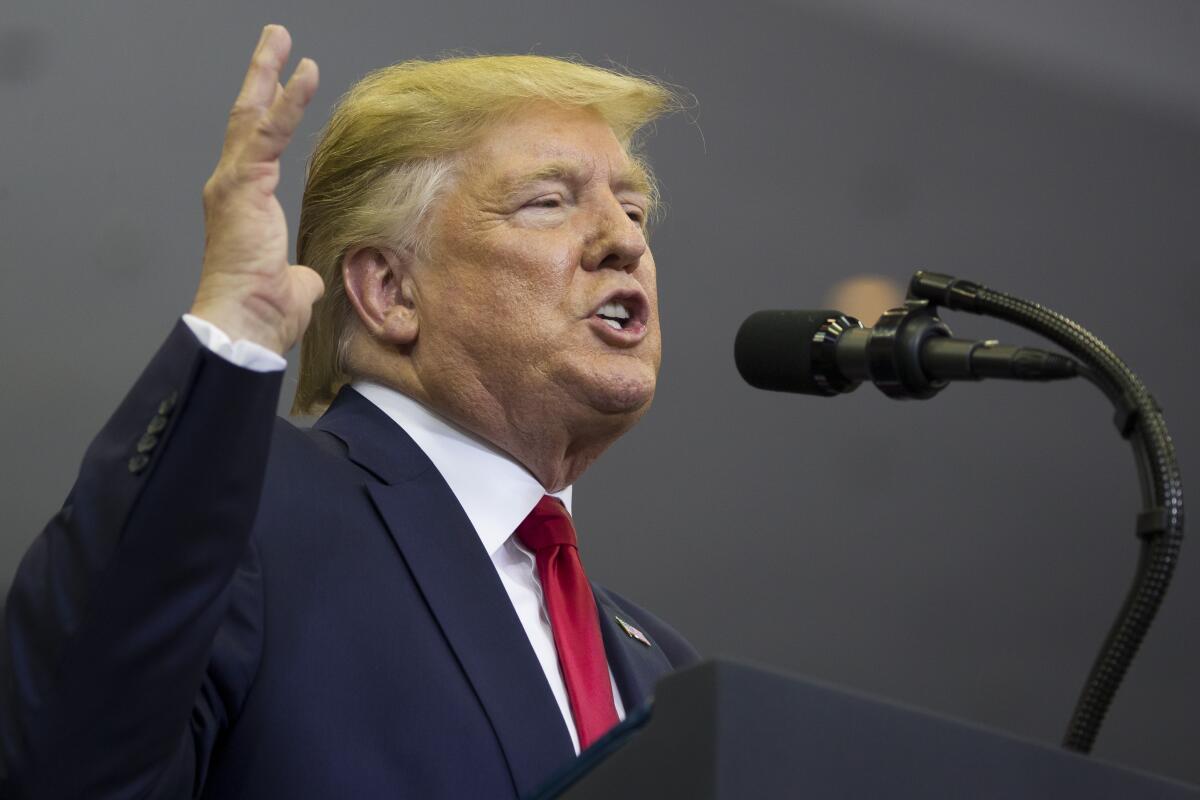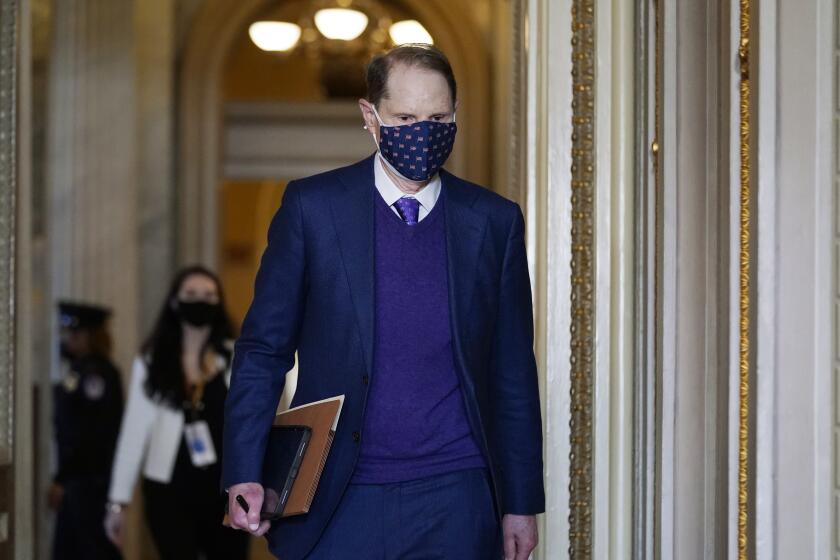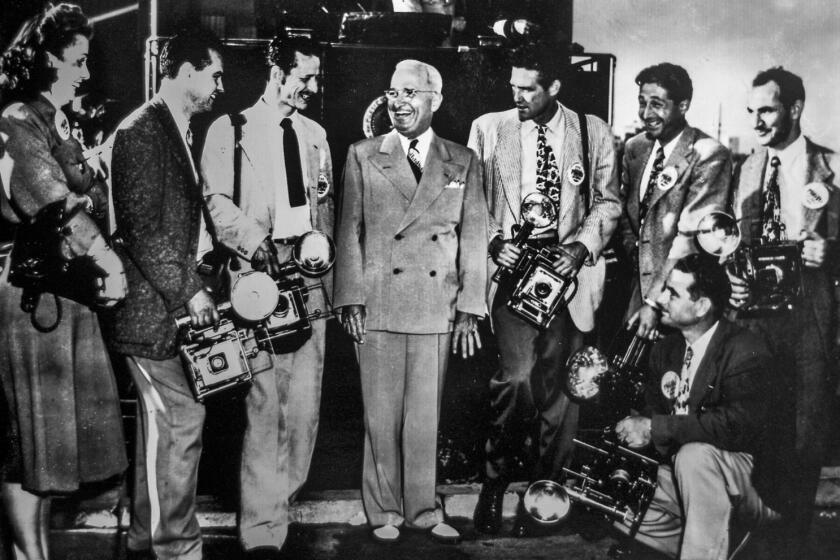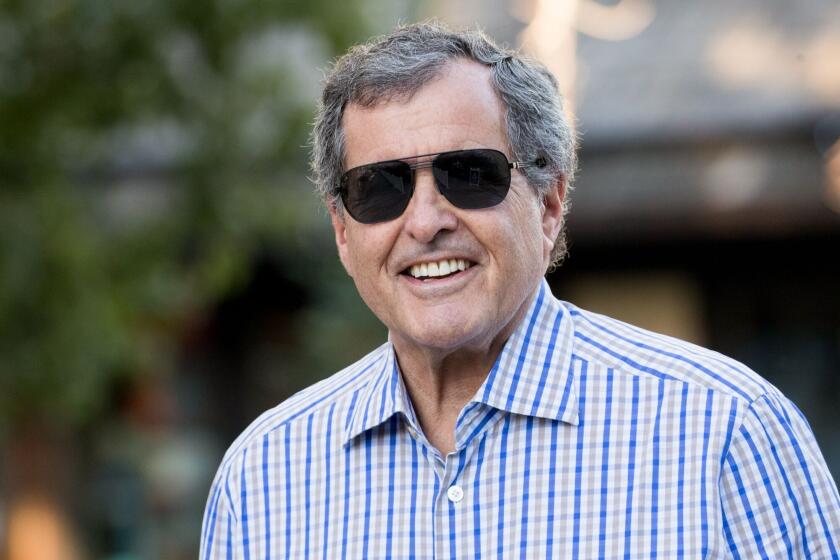Trump’s latest deal could set a high water mark for investment scams

- Share via
For a while there, it seemed that the SPAC boom had run out its string. Then came Donald Trump.
Already confused?
Let’s start with first principles. SPACs, or special purpose acquisition companies, are shell companies that collect funds from investors on the expectation that they’ll find a private company to merge into within a given period of time, usually 24 months.
It is never a good idea to invest in a SPAC just because someone famous sponsors or invests in it or says it is a good investment.
— Securities and Exchange Commission
The wrinkle is that the SPAC doesn’t have a target in mind at the outset, so these are the blindest of blind pools.
The SPAC boom built through 2020 and through the first quarter of this year, peaking at some 300 deals in that quarter alone.
Get the latest from Michael Hiltzik
Commentary on economics and more from a Pulitzer Prize winner.
You may occasionally receive promotional content from the Los Angeles Times.
Many were associated with big names in sports and entertainment such as Shaquille O’Neal and Jay-Z, or political and business luminaries such as Paul Ryan and Sam Zell, the onetime owner of The Times.
By mid-year, the thrill appeared to be over. Since the end of the first quarter, only about 300 more SPACs have come to market, according to SPAC Research.
More saliently, investors have been pulling their money out of SPACs at an increasingly high rate. In the SPAC model, investors can bail, or “redeem” their investments, once a target has been identified. The average redemption rate in the latest quarter exceeded 50%, up from 10% at the start of the year. That’s a sign that investors are growing more skeptical of their returns from SPAC mergers.
Enter Trump. On Oct. 20, a SPAC named Digital World Acquisition Corp. announced that it had found a merger target in Trump Media & Technology Group. Trump Media claims to be a business that aims to challenge what it calls the “tech monopoly” in media, which it asserts aims to silence conservative voices, like Trump’s.
Wall Street is enticing investors with SPACs — funds that won’t say what they’re buying.
Despite Trump Media not having issued a discernible financial plan or explained how it intends to go about this task, interest in Digital World went stratospheric, with its shares soaring from about $10 (the standard IPO price for pre-merger SPACs), to $175 in the two days after the announcement.
Since then, Trump Media has missed a self-imposed deadline of November to launch a beta version of Truth Social, a social media platform that would supposedly be an alternative to Twitter (which has banned Trump). The world is still waiting. The problem may have been that a very early iteration of the site was compromised into oblivion by a tidal wave of trolls expressing anything but admiration for Trump.
On Dec. 6, Trump’s company did disclose that it has hired a chief executive: Rep. Devin Nunes (R-Tulare), who will quit Congress to take the job, never mind that he has never run a media company before, but he has shown a sedulous devotion over the years to Trump.
Nunes hasn’t explained his decision to leave Congress, though it’s reasonable to assume that it has something to do with the prospect that his district will become more Democratic in the pending redistricting.
The Trump SPAC deal has attracted the attention of Sen. Elizabeth Warren (D-Mass.), who has devoted her career to outing financial phonies. In a Nov. 17 letter to Securities and Exchange Commission Chair Gary Gensler, Warren used the deal to underscore that SPACs are inadequately regulated.
The deal, Warren said, appears to be “a textbook example of a SPAC misleading shareholders and the public about materially important information.”
In ‘It Can’t Happen Here,’ Sinclair Lewis foresaw not only that a coup would come from the right, but that it would come clothed in populist rhetoric.
She was referring to alleged undisclosed contacts between DWAC and Trump associates, which contradicted DWAC’s consistent claims that it had not “initiated substantive discussions, directly or indirectly, with any business combination target.” Under federal law, Warren observed, those discussions were required to be publicly disclosed.
Warren also expressed concern that “DWAC’s acquisition of Trump Media and Technology may reignite the market” for SPACs. That’s troubling, she indicated, given signs that SPACs have a tendency to disadvantage small investors compared to promoters.
As it happens, the SPAC market has shown modest signs of life lately, starting around the time of the DWAC announcement about Trump.
Many investors who may have been enticed into Digital World by the magic of Trump’s name, such as it is, may have already had their heads handed to them, as the shares have fallen from their peak of $175 to $50.49 at Monday’s close.
That has reinforced the impression that SPACs are made to fatten the wallets of promoters and their insider friends at the expense of credulous small investors, especially when they have little going for them other than a celebrity name.
“These newer SPACs increasingly feel like an inside joke for the super-rich and a way for celebrities to monetize their reputations,” Jim Cramer, the stock trading guru at CNBC, told listeners in March. “Believe me, you don’t want to invest in someone else’s inside joke.”
Cramer was seconding the SEC, which issued an investor alert around the same time, warning, “It is never a good idea to invest in a SPAC just because someone famous sponsors or invests in it or says it is a good investment.”
As I reported in March during the frenzy, the SPAC system hid numerous pitfalls for unwary small investors, who may have been lured by the notion that SPACs enabled hidden gems among private companies to go public more cheaply than through an initial public offering.
Leon Cooperman is the latest American billionaire to complain about a wealth tax and “vilification of the rich.”
“Costs built into the SPAC structure are subtle, opaque, and far higher than has been previously recognized,” law professors Michael Klausner of Stanford and Michael Ohlrogge of New York University reported in a paper in November 2020. (Their paper was titled “A Sober Look at SPACs.”)
In other words, for investors and startups alike, SPACs present nothing new under the sun. They just look new.
So what about this Trump deal? It didn’t last for more than a few days before raising eyebrows among financial regulators. As Digital World disclosed on Dec. 6, in late October it received an inquiry from the Financial Industry Regulatory Authority, or FINRA, a Wall Street self-regulatory body, about suspicious trading in its shares ahead of the announcement.
The disclosure states that in early November, the SEC asked for information about “certain ... communications between DWAC and TMTG,” among many other things. Neither FIRA nor the SEC has said that any wrongdoing has been established thus far.
As for Trump Media & Technology Group, it’s not what you would call a solidly established business enterprise. The investor presentation Digital World filed with the SEC on Dec. 6 is devoid of business information. It’s heavily devoted to Trumpian grousing about “Tech Monopoly Censorship” and to airy claims about the enterprise’s “market opportunity.”
The latter is pegged at 457 million potential users generating $35 billion in annual revenue. Trump conjured up those figures by adding together the market reach and revenues of Netflix, Twitter and the radio and podcast firm iHeartMedia.
A couple of other aspects of the presentation are bound to raise smiles. It calculates Trump’s “historic social media following” at 146 million, although the figure is the sum of his followers on Instagram, Facebook and Twitter, which may have overlapped, and although his current following on Twitter is zero because he’s been banned from the platform.
Hiltzik: Trump will get millions in post-presidential benefits, thanks to Harry Truman’s lies
Harry Truman lied about his poverty. Those mistruths produced millions in government benefits for his successors.
The slide deck lists 30 executives and other members of Trump Media’s “technology team,” presumably to bolster the notion that it’s a serious tech company.
But the team members are identified only by their first names and initials of their last names — i.e., “Josh A.” and “Tom M.,” like peripheral characters in a 19th century Russian novel. The deck notes, “personnel subject to change,” so if you were basing your investment on, say, “Steve E.” serving as VP, engineering, you may be disappointed.
The entire deck is attributed to the firm of E.F. Hutton. This isn’t your father’s or grandfather’s E.F. Hutton, the brokerage renowned for its “When E.F. Hutton talks, people listen” ad campaign of the 1960s. That E.F. Hutton got absorbed by Shearson Lehman Bros. (remember them?) in 1988 after an enormous fraud scandal and was owned by American Express and Citigroup in the course of a series of mergers.
The brand name was evidently controlled by one Stanley Hutton Rumbough, grandson of the original Edward Francis Hutton, who ceded it to Kingswood Capital Markets, an investment bank, which rebranded itself to evoke the “rich history, successful legacy and long-recognized value” of the old name, never mind the fraud scandal. Anyway, Kingswood seems to be the investment bank associated with Trump Media.
There isn’t much more to say about this SPAC deal, at least until Trump and his new CEO actually do something media-like. The deal has followed the SPAC model to the point of arranging a $1-billion cash infusion from outside investors known as a PIPE, for “private investment in public equity.”
The PIPE investors appear to be getting a good deal in that they are assured of buying shares in the merged company at a steep discount to the shares’ public price. That assures them almost certainly of being able to flip their shares at a profit the moment the merged company goes public. In the estimate of Bloomberg financial columnist Matt Levine, the goal is indistinguishable from encouraging them to find “some retail rubes” to foist the shares on.
That’s particularly true in light of the fact that Trump Media has yet to demonstrate that it is a genuine company. What it has is a business pitch derived from Trump’s epic resentments, a CEO with no apparent experience, and a management team that can’t be identified.
It also has Trump’s name, which has been known in the past to attract investors and lenders to a purported university, a failing casino, and other businesses hawking vodka and steaks. To anyone who wants to play in this sandbox, we can only say: “Good luck, suckers.”
More to Read
Get the latest from Michael Hiltzik
Commentary on economics and more from a Pulitzer Prize winner.
You may occasionally receive promotional content from the Los Angeles Times.













